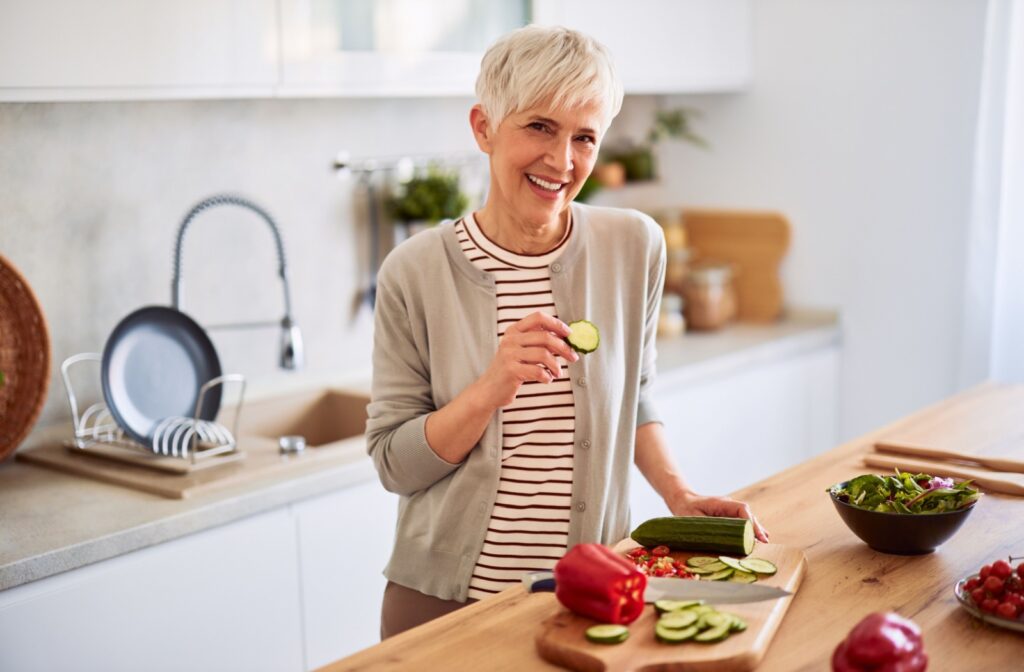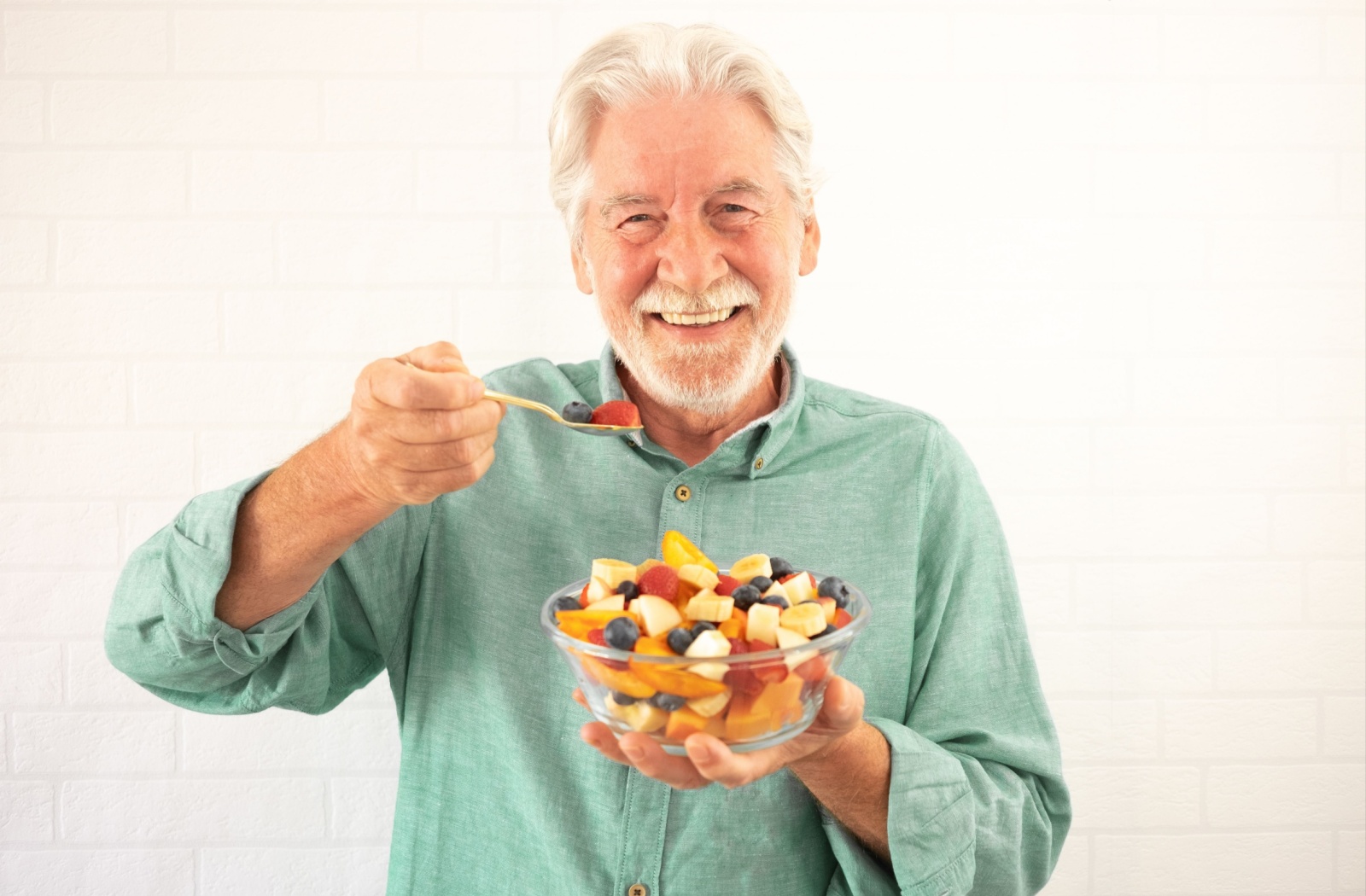As our loved ones grow older, their nutritional needs and eating habits change. Having healthy snacks accessible for older adults, whether that’s at home or in senior living, can be a game-changer in maintaining their overall well-being.
Healthy snacks for older adults can include:
- Fruits and vegetables
- Whole grains
- Protein sources
- Healthy fats
Not only do snacks help bridge the gap between meals, but they also provide essential nutrients that may be lacking in older adults’ regular diets.
Understanding the Nutritional Needs of Senior Citizens
As people age, their bodies undergo various changes that affect their nutritional requirements. Older adults often face challenges such as decreased appetite, slower metabolism, and changes in taste and digestion.
These factors make it essential to focus on nutrient-dense foods that provide vitamins and minerals without excessive calories. Additionally, older adults may require higher amounts of certain nutrients, such as calcium, B vitamins, vitamin E, iron, and zinc.
Importance of Balanced Nutrition
Balanced nutrition is the foundation of good health at any age. A balanced diet rich in fruits, vegetables, whole grains, lean proteins, and healthy fats is crucial for older adults.
These foods do several things to support overall health, such as:
- Help meet nutritional needs
- Help maintain a healthy weight
- Help maintain muscle mass
- Increase energy levels
- Reduce the risk of chronic diseases
Factors to Consider When Choosing Healthy Snacks
With many options available, consider some factors when choosing healthy snacks.
Age-Related Changes
Older adults often experience changes in their sense of taste and smell, affecting their appetite and food preferences. It’s important to choose snacks that are both nutritious and appealing. Opt for foods with vibrant colors, varied textures, and mild flavors to stimulate their senses and encourage healthy eating.
Digestive changes can also impact how older adults process certain foods. Therefore, it’s essential to select snacks that are easy to digest and gentle on the stomach. Soft fruits, cooked vegetables, and yogurt are some choices that provide nutrients without causing discomfort.
Portion Control & Nutrient Density
Portion control is another key factor when choosing snacks for older adults. Smaller, frequent meals and snacks can help prevent overeating and provide a steady intake of nutrients throughout the day. Focus on nutrient-dense foods that offer high nutritional value in small portions.
A Guide to Healthy Snacks for Senior Citizens

Here are some practical suggestions for choosing nutrient-dense snacks that meet the unique nutritional needs of older adults.
Fruits & Vegetables
Fruits and vegetables are rich in vitamins, minerals, and antioxidants to promote overall health. They are also low in calories and high in fiber, making them ideal snacks for older adults. Some easy-to-prepare options include:
- Apple slices or celery with almond or peanut butter
- Carrot sticks with hummus
- Mixed berries with a dollop of Greek yogurt
Whole Grains
Whole grains provide essential carbohydrates, fiber, and nutrients that support energy levels and digestive health. Incorporate whole grain snacks such as:
- Oatmeal cookies
- Whole grain crackers
- Popcorn
Protein Sources
Protein is vital for maintaining muscle mass and supporting overall health. These snacks are easy to prepare and provide protein to keep older adults strong and active. Choose protein-rich snacks such as:
- Hard-boiled eggs
- Cottage cheese with fruit
- Turkey roll-ups
- Bean dip
Healthy Fats
Healthy fats are essential for brain health and overall well-being. These foods provide healthy fats that support cognitive function and heart health. Snacks with healthy fats include:
- Nuts
- Seeds
- Avocado slices
Tips for Encouraging Healthy Snacking
Caregivers and family members play a crucial role in encouraging healthy snacking habits. By providing a variety of nutritious snacks and involving older adults in the selection process, you can help them make better choices.
Create a snack station with pre-portioned options to make it easy for older adults to grab a healthy snack whenever they’re hungry. Variety is key to maintaining interest in healthy snacks. Rotate different fruits, vegetables, and protein sources to keep things exciting. Encourage older adults to try new foods and flavors to expand their palate.
Sharing healthy snacks can also foster a sense of community and belonging. Social interactions during snack times can improve mental well-being and reduce feelings of isolation. Encourage older adults to enjoy snacks with friends, family, or fellow residents in senior living communities to enhance their social connections.
Healthy Aging in Senior Living Communities
Healthy snacking is a simple yet powerful way to support the well-being of older adults. By understanding their unique nutritional needs and providing a variety of nutrient-dense snacks, we can help them maintain their health, vitality, and overall quality of life.
To learn more about how senior living communities support healthy eating and overall well-being, contact State Street Assisted Living to explore our services and dining options.










